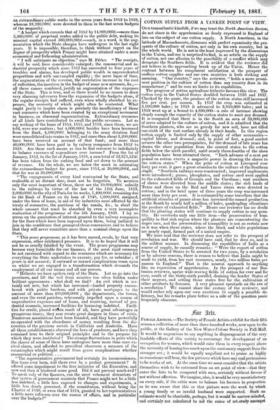COTTON SUPPLY FROM A YANKEE POINT OF VIEW.
OUR transatlantic kinsfolk, if we may trust the North ihnerkan Review, do not share in the apprehension so freely expressed in England of late on the subject of our cotton supply. A North American, in the latitude of Massachnssets, discusses with perfect equanimity the pro- spects of the culture of cotton, not only in his own country, but in the whole world. He is not in the least impressed by the dissensions in the Union, and one is surprised to find, in an article on the supply of cotton, not one allusion to the possibility of a conflict which may devastate the Southern fields. It is evident that the reviewer did not believe in the approaching break up of the Union.. Hence the contrast between his complacent satisfaction at the prospect of endless cotton supplies and our own anxieties is both striking and amusing. " Our country," says the reviewer, "holds a more promi- nent position in the culture of cotton than any country does in its manufacture ;" and he sees no limits to its capabilities. The progress of cotton agriculture hitherto favours this view. The cotton crop in the United States doubled between 1826 and 1837. Checked by the panic, the produce of the cotton states still increased five per cent, per annum. In 1857 the crop was estimated at 3,100,000 bales ; in 1858 it advanced to 3,850,000 bales; and hi 1859 went up at a bound to 4,800,000—a rate of increase showing clearly enough the capacity of the cotton states to meet any demand. It is computed that there is in the South an area of 39,000,000 of acres adapted to the culture of cotton, and it is admitted that the Southern planters, who are so greedy for new soil, have not tilled one-sixth of the vast surface already in their hands. In this region cotton supply is limited only by the supply of other necessaries— capital labour, and demand; and, in point of fact, a good market secures the other two prerequisites, for the demand of late years has drawn the slave population from the central states to the cotton fields below the sixth parallel, until nearly three-fourths of the slave population have been attracted there. "Each advance of a cent per pound on cotton exerts a magnetic power in drawing the slaves to the cotton states." When the price of cotton at Liverpool rose forty per cent, it gave a great stimulus to the culture of the Southern staple. "Southern railways were constructed; improved implements were introduced; guano, phosphates, and cotton seed were applied to the exhausted fields of Georgia and the Carolinas; vast numbers of slaves were diverted from the middle states; the rich lands of Texas and those on the Red and Yazoo rivers were devoted to cotton; and in the brief space of three years the crop was increased more than forty per cent. It is estimated by some travellers that the artificial stimulus of guano alone has increased the annual production at the South by nearly half a million of bales, quadrupling oftentimes the produce of exhausted fields." Hence our reviewer has no doubt that the planting states will continue to supply cotton in any quan- tity. He overlooks only one little item—the preservation of tran- cpullity in that rich region where the planters are concentrating the negro race, and the preservation of tranquillity is not so certain now as it was when these states, where the black and white populations are nearly equal, formed part of a united empire. We have said that the reviewer does not refer to the prospect of revolution and war. We should have said, that he does so, and, in the mildest manner. In discussing the capabilities of India as a source of supply, he casually remarks : "Were the export of cotton from the United States to be arrested for two years, by a revolution or by adverse seasons, there is reason to believe that India might be made to yield, from her vast resources, nearly, two million bales per annum to Faigland." That is the nearest approach to anything like an expression of apprehension. In the prospect of our Bos- tonian reviewer, uprise wide-waving fields Of cotton, for ever and for ever, south of the thirty-sixth parallel, draining the border States of their negroes, and setting those states free for the cultivation of other products by freemen. A very pleasant spectacle on the eve of a revolution ! We cannot share the ecstasy of the reviewer, and would rather rely upon our own exertions to supply a possible de- ficiency, but his remarks place before us a side of the question panic frequently obscures.






























 Previous page
Previous page